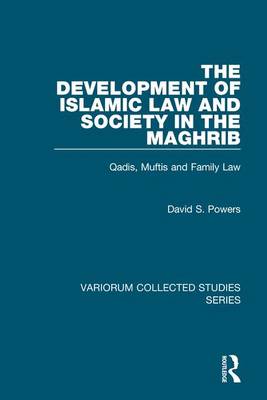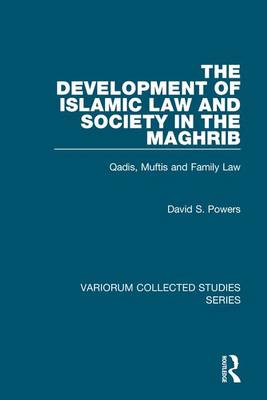
Door een staking bij bpost kan je online bestelling op dit moment iets langer onderweg zijn dan voorzien. Dringend iets nodig? Onze winkels ontvangen jou met open armen!
- Afhalen na 1 uur in een winkel met voorraad
- Gratis thuislevering in België vanaf € 30
- Ruim aanbod met 7 miljoen producten
Door een staking bij bpost kan je online bestelling op dit moment iets langer onderweg zijn dan voorzien. Dringend iets nodig? Onze winkels ontvangen jou met open armen!
- Afhalen na 1 uur in een winkel met voorraad
- Gratis thuislevering in België vanaf € 30
- Ruim aanbod met 7 miljoen producten
Zoeken
The Development of Islamic Law and Society in the Maghrib
Qadis, Muftis and Family Law
David S Powers
€ 221,95
+ 443 punten
Omschrijving
The first eleven essays in this collection treat the application of Islamic law in qadi courts in the Maghrib in the period between 1100 and 1500 CE. Based on preserved legal documents and the expert opinions of Muslim jurists (Muftis), the essays examine family law cases involving legal minority, guardianship, divorce, inheritance, bequests, and endowments. Cumulatively, the cases bear witness to the effectiveness and efficiency of the Islamic judicial system in this period. Contrary to popular perceptions, the cases demonstrate that Muslim jurists placed a high value on reasoned thought and were sensitive to the manner in which law, society, and culture interacted with, and shaped, each other. The final essay shows how the treatment of family endowments by colonial regimes in Algeria and India at the end of the 19th and beginning of the 20th centuries shaped, or misshaped the modern western scholarly understanding of Islamic law.
Specificaties
Betrokkenen
- Auteur(s):
- Uitgeverij:
Inhoud
- Aantal bladzijden:
- 356
- Taal:
- Engels
- Reeks:
Eigenschappen
- Productcode (EAN):
- 9781409403708
- Verschijningsdatum:
- 28/10/2011
- Uitvoering:
- Hardcover
- Formaat:
- Genaaid
- Afmetingen:
- 149 mm x 224 mm
- Gewicht:
- 780 g

Alleen bij Standaard Boekhandel
+ 443 punten op je klantenkaart van Standaard Boekhandel
Beoordelingen
We publiceren alleen reviews die voldoen aan de voorwaarden voor reviews. Bekijk onze voorwaarden voor reviews.











